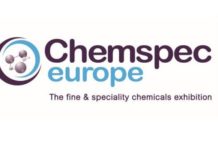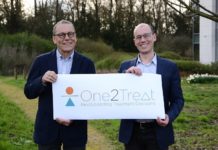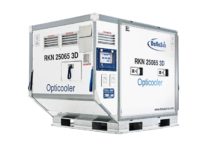Bristol-Myers Squibb Company and Pfizer Inc.announced that the ADVANCE-3 study results, published in The New England Journal of Medicine, showed apixaban was statistically superior to 40 mg once daily enoxaparin in reducing the incidence of venous thromboembolism in patients undergoing elective total hip replacement surgery.
The study results also showed comparable rates of the composite of major and clinically relevant non-major bleeding, including surgical site bleeding, in patients treated with apixaban compared with those treated with enoxaparin.
Patients undergoing major orthopedic surgery, including total hip replacement, are at high risk for venous thromboembolism. In fact, venous thromboembolism occurs in 40 percent to 60 percent of patients undergoing orthopedic surgery who do not receive preventive care. With close to 200,000 hip replacement surgeries performed each year in the United States, the threat of venous thromboembolism and its associated morbidity and mortality risk represent a growing challenge to physicians.
Apixaban is an investigational, oral, highly selective Factor Xa inhibitor, part of a class of agents being studied for their potential to prevent and treat blood clots in the veins and arteries. Results of ADVANCE-3 were first presented in July 2010, at the 21st International Congress on Thrombosis in Milan, Italy.
Michael Rud Lassen, M.D., Hoersholm Hospital in Copenhagen, Denmark, lead investigator for the study said, One of the major concerns for orthopedic surgeons using oral anticoagulants for venous thromboembolism prevention in hip surgery is the significant risk of bleeding. We are encouraged by the ADVANCE-3 data, which demonstrated that apixaban provides more effective thromboprophylaxis without an increased risk of bleeding, when compared with enoxaparin, and has the advantages of oral administration, which is particularly beneficial once patients leave the hospital.
About ADVANCE-3
ADVANCE-3, a randomized, double-blind, multicenter, head-to-head trial was designed to evaluate the efficacy and safety of oral, twice daily apixaban 2.5 mg compared with subcutaneous enoxaparin 40 mg once daily, over a 35-day treatment period for reducing the risk of venous thromboembolism in patients undergoing elective total hip replacement surgery.
Of the 5,407 patients from 21 countries (Europe, Asia/Pacific, Latin America, Africa) randomized in the study, 3,866 patients were eligible for the analysis of the primary efficacy endpoint defined as the composite of adjudicated asymptomatic or symptomatic deep vein thrombosis, nonfatal pulmonary embolism or death from any cause during study treatment.
When apixaban was compared with enoxaparin, the primary efficacy endpoint occurred in 1.4 percent of patients in the apixaban group and 3.9 percent of patients in the enoxaparin group, demonstrating a statistically significant relative risk reduction for apixaban of 64 percent (one-sided P<0.001 for noninferiority and two-sided P<0.001 for superiority).
The secondary efficacy outcome of major venous thromboembolism – defined as the composite of adjudicated asymptomatic or symptomatic proximal deep vein thrombosis, nonfatal pulmonary embolism, or death related to venous thromboembolism – occurred in 0.5 percent of patients in the apixaban group compared with 1.1 percent in the enoxaparin group, demonstrating a statistically significant relative risk reduction for apixaban of 60 percent (one-sided P<0.001 for noninferiority and two-sided P=0.01 for superiority).
A principal safety measure, the composite of major and clinically relevant non-major bleeding, occurred in 4.8 percent and 5.0 percent of patients in the apixaban and enoxaparin groups, respectively (P=0.72). The safety measure of major bleeding occurred in 0.8 percent of patients who received apixaban, and in 0.7 percent of patients who received enoxaparin (P=0.54).
In ADVANCE-3, the overall safety profiles (i.e., bleeding, adverse events, serious adverse events, discontinuations due to adverse events, liver function test increases) of apixaban and enoxaparin were similar. In addition, the number of deaths, myocardial infarctions, strokes and episodes of thrombocytopenia (low platelet count) in the study was low.
About Venous Thromboembolism
Venous thromboembolism encompasses two serious conditions: deep vein thrombosis, a blood clot in a vein, usually in the leg that partially or totally blocks the flow of blood; and pulmonary embolism, a blood clot blocking a vessel in the lungs. Deep vein thrombosis causes multiple symptoms including pain, swelling and redness and, more importantly, can progress to pulmonary embolism, which carries the risk of sudden death.
About the Apixaban Clinical Trial Program
Apixaban is being investigated within the EXPANSE Clinical Trials Program, which is projected to include nearly 60,000 patients worldwide across multiple indications and patient populations and includes a total of nine completed or ongoing, randomized, double-blind Phase 3 trials, including ADVANCE-3.
The dose and regimen for apixaban were informed by Phase 2 apixaban clinical trial data and data modeling results, which suggest 2.5 mg twice daily dosing provides the optimal balance of safety and efficacy in the prevention of venous thromboembolism.
In addition to prevention of venous thromboembolism, apixaban is in Phase 3 trials studying the prevention of stroke and other thromboembolic events in patients with atrial fibrillation and the treatment of venous thromboembolism.
About the Bristol-Myers Squibb/Pfizer Collaboration
In 2007, Pfizer and Bristol-Myers Squibb entered into a worldwide collaboration to develop and commercialize apixaban, an investigational oral anticoagulant discovered by Bristol-Myers Squibb. This global alliance combines Bristol-Myers Squibb’s long-standing strengths in cardiovascular drug development and commercialization with Pfizer’s global scale and expertise in this field.
About Bristol-Myers Squibb
Bristol-Myers Squibb is a global biopharmaceutical company whose mission is to discover, develop and deliver innovative medicines that help patients prevail over serious diseases. For more information, please visit www.bms.com, or follow us on Twitter at http://twitter.com/bmsnews.
Pfizer Inc: Working together for a healthier world
At Pfizer, we apply science and our global resources to improve health and well-being at every stage of life. We strive to set the standard for quality, safety and value in the discovery, development and manufacturing of medicines for people and animals. Our diversified global health care portfolio includes human and animal biologic and small molecule medicines and vaccines, as well as nutritional products and many of the world’s best-known consumer products. Every day, Pfizer colleagues work across developed and emerging markets to advance wellness, prevention, treatments and cures that challenge the most feared diseases of our time. Consistent with our responsibility as the world’s leading biopharmaceutical company, we also collaborate with health care providers, governments and local communities to support and expand access to reliable, affordable health care around the world. For more than 150 years, Pfizer has worked to make a difference for all who rely on us. To learn more about our commitments, please visit us at www.pfizer.com.


























